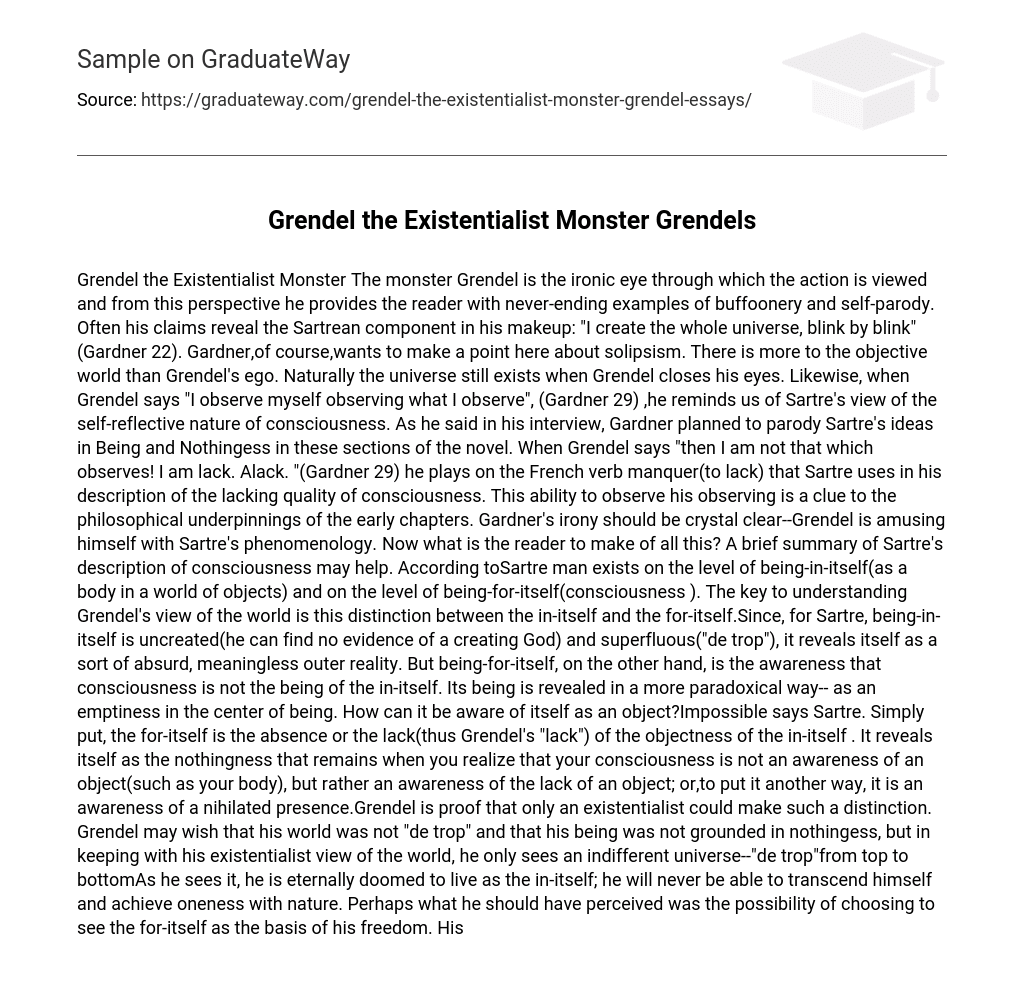Grendel the Existentialist Monster
The monster Grendel is portrayed as an ironic observer, offering continuous examples of foolishness and self-mockery. His statements often expose his Sartrean nature, such as when he arrogantly declares, “I create the whole universe, blink by blink” (Gardner 22). Gardner seeks to emphasize the concept of solipsism here. However, it is important to remember that there is a larger objective reality beyond Grendel’s self-centered perspective. The universe continues to exist even when Grendel shuts his eyes.
The text highlights the similarities between Grendel’s observation and Sartre’s idea of self-reflective consciousness. Gardner intended to satirize Sartre’s concepts in Being and Nothingness through the novel. Grendel’s statement “then I am not that which observes! I am lack. Alack.” is a play on Sartre’s use of the verb manquer that symbolizes the lacking aspect of consciousness. This ability to observe his own observation indicates the philosophical foundation of the initial chapters.
Gardner’s irony should be crystal clear
Grendel is interested in Sartre’s phenomenology and is deriving entertainment from it. So, what should the reader take away from this? Here is a brief summary of Sartre’s explanation of consciousness to provide some help. According to Sartre, humans exist in two realms – being-in-itself (as a physical body among objects) and being-for-itself (consciousness). The key to understanding Grendel’s perspective lies in this distinction between the two realms. Sartre believes that being-in-itself is uncreated (he finds no evidence of a God who created it) and unnecessary (“de trop”), resulting in an absurd and meaningless external reality.
Being-for-itself is the awareness that consciousness is not the being of the in-itself. It is paradoxically revealed as an emptiness at the center of being. Sartre asserts that being-for-itself cannot recognize itself as an object. In simpler terms, it is the absence or lack known as Grendel’s “lack” in the in-itself. This absence manifests as nothingness when one realizes their consciousness does not perceive an object like their body, but rather perceives the absence of an object. Put differently, it is an awareness of a presence that has been negated.
Grendel exemplifies the belief that only an existentialist could distinguish such a concept. Grendel may desire for his world to not be pointless and for his existence to have meaning, but in accordance with his existentialist perspective, he perceives an indifferent universe throughout. In his perspective, he is forever condemned to exist as the in-itself; he can never transcend himself and achieve unity with nature. Perhaps he should have recognized the potential of choosing to perceive the for-itself as the foundation of his freedom. However, his self-deception prevents him from considering that option. He objectifies his consciousness and behaves as if he is merely an object.
Elsewhere, Grendel shifts the focus to Sartre’s discussion of the metaphysical nausea caused by a world of meaningless objects when he tells his mother that he now comprehends “the meaningless, objectness of the world, the universal bruteness.” (Gardner 28) In all of this, Gardner’s polemic targets Grendel’s bad-faith. Even though Grendel is the offspring of Cain, he consistently reminds himself (similar to the shaper) that he has the freedom to change his actions. However, he questions why he should, on what grounds? Therefore, he consciously denies his ability to choose moral behavior and persists in believing the falsehood that he is a meaningless object. His nihilistic revelations concerning the indifference of the universe and the relativity of values are nothing more than an ineffectual effort to justify his role as a murderer. These ironic lines only serve to confirm the existence of the for-itself.
When the forest echoes “why not?” (in other words, why not be good?), it is actually echoing Grendel’s own repressed self. In summary, Grendel, the existentialist monster, serves as an excellent means for Gardner to analyze the weaknesses in Sartre’s definition of consciousness as nothingness.





